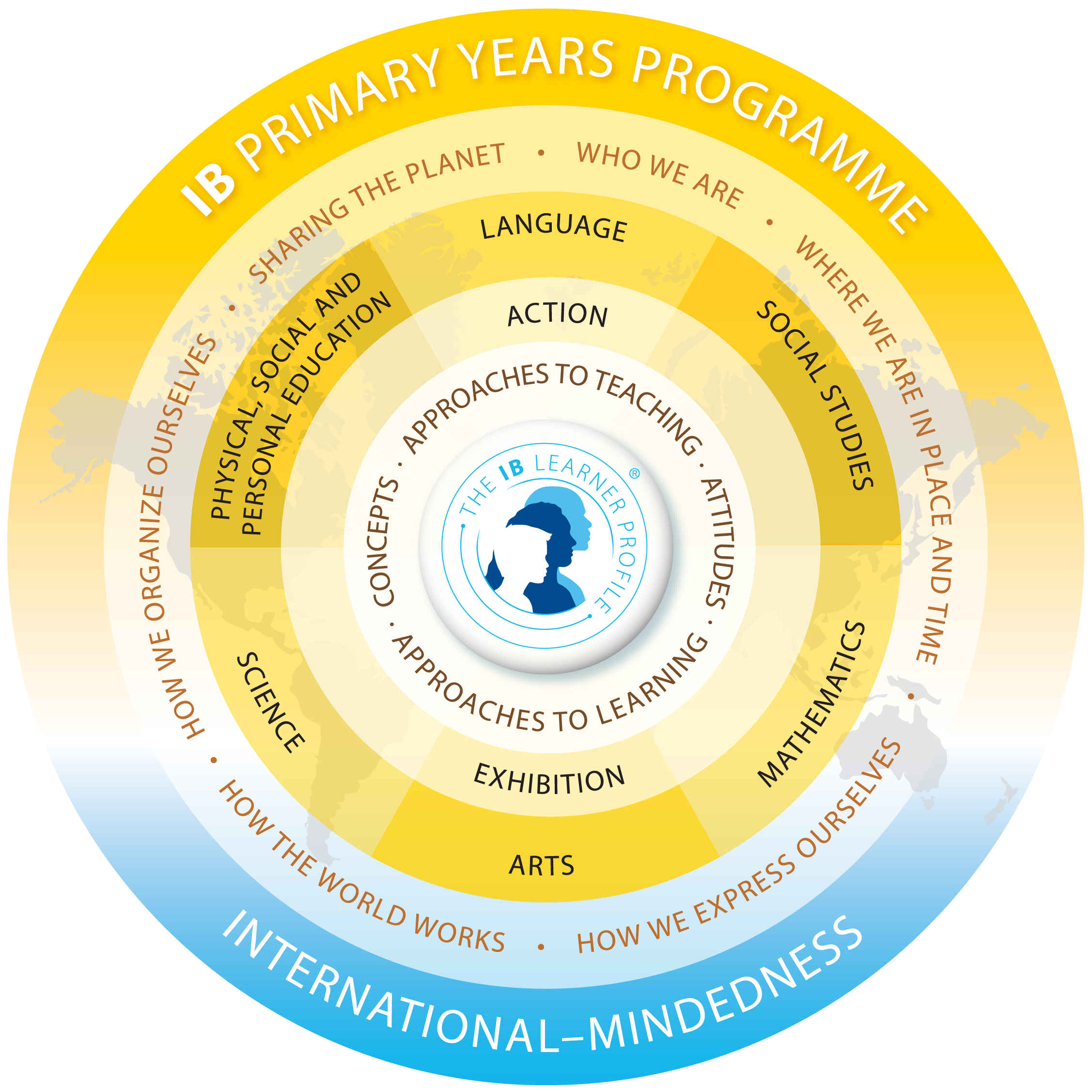At Utahloy International School Zengcheng (UISZ), we are authorized by the International Baccalaureate Organization (IB) to teach the Primary Years Programme (PYP). The PYP is a framework designed by the IB through which we deliver the curriculum. It is inquiry-based, driven by the questions teachers and students generate. Our Early Years to Year 5 students are encouraged to be active learners, to stretch their thinking by asking questions that deepen their understanding of a concept or skill, and to apply their learning to take action and make a difference in our local and global communities.
PYP Programme
AN INQUIRY-BASED PROGRAMME
Driven by Curious Minds


The Principles
A unique feature of the PYP is the transdisciplinary nature of the programme. Wherever possible, knowledge and skills associated with social studies, science, literacy, math, arts, design thinking, and computational thinking are integrated into our Programme of Inquiry (POI). From K3 to Year 5, students engage in six units of inquiry each year and four units of inquiry in Kindergarten. This provides the time to learn new concepts and engage in meaningful play. The POI is reviewed continually to ensure alignment with curricular expectations and consistency across and within the year levels. Standalone instruction in specific literacy and math skills also plays a part in our balanced programming, ensuring students are set up for success by providing solid foundational skills. UISZ uses the Contexts for Learning to teach concept-driven mathematics. This program, developed in the Netherlands and used in European international schools, is research-supported and highly respected worldwide. UISZ uses a Writer’s Workshop to teach writing. Writer’s Workshop, a framework for teaching writing, is used widely across Europe and the United States to develop independent and passionate young writers.
The Programme Components
Our Language Acquisition program features English and Chinese in the PYP from Kindergarten to Year 5. Additional languages, such as Korean and French, are offered as exposure languages during the school day or after school during ECAs. Specialists teach our personal-social and physical education, art, and music and are a regular part of a student’s weekly timetable. At the end of Year 5, students and families decide which language the student will continue to learn in MYP.
Learner Agency
PYP students with agency use their initiative and take responsibility and ownership of their learning. They direct their knowledge with a strong sense of identity and self-belief and, in conjunction with others, build a sense of community and awareness of the opinions, values, and needs of others. The PYP creates opportunities for students to take the initiative, express interest and wonderings, and make choices.
Learner Profile
The attributes of the learner profile represent a broad range of human capacities, mindsets, humanist values, and responsibilities that encompass intellectual, personal, emotional, and social growth. The practice, development, and demonstration of these attributes are foundational to students becoming internationally minded, agentic, and active members of our community and global citizens who value themselves, others, and the world we share. IB learners strive to become inquirers, knowledgeable, thinkers, communicators, principled, open-minded, caring, courageous, , balanced and reflective.
Action
In the PYP, ‘Taking Action’ is broken into five essential elements: Participation, Advocacy, Social Justice, Social Entrepreneurship and Lifestyle Choices. These ideas have been put together to support these elements of action and to encourage our agentic learners to take meaningful action to make a difference in the world. Agency is when our students feel and have ownership of their learning journey and the action that comes from that learning. Our task as educators and as a community is to facilitate opportunities for student learning that enable engagement, empathy, and active participation. Through individual and collective action, students understand and take on the responsibilities of being an internationally minded global citizen and appreciate the value of working with others for a shared purpose to make a positive impact.
Examples of Action:
- Participation: a student decides to join another student’s project and participate.
- Advocacy: A student recognizes that other students are littering on the playground, researches the impact of litter on the environment, cares and wants to teach others, and creates posters around the school.
- Social Justice: A student recognizes that sometimes there are students on the playground looking for a friend to play with, empathizes, and decides to take action by making a “friend bench.” The “friend bench” is a place to make new friends during recess.
- Social Entrepreneurship: A group of students begin a community garden to learn about growing vegetables and teach other students about plant life (advocacy). They plan a fundraiser event and a bake sale to raise funds for their project.
- Lifestyle Choices: A student learns about the harmful effects of plastics and decides not to buy products with lots of plastic waste and bring a water bottle to school rather than use disposable plastic cups. When students engage in action and are supported by peers and trusted adults, they feel they can plan and create positive change in their local and global community…which is empowering.
PYP Exhibition
The PYP Exhibition (or the PYPx) takes place in Year 5 and is included in the unit Sharing the Planet. The PYPx is an opportunity for Year 5 students to practice and demonstrate the Learner Profile attributes, approaches to learning, and understanding of the inquiry cycle to plan and complete a project aligned with one of the United Nations Sustainable Development Goals. Through the exhibition, students demonstrate their ability to take responsibility for and ownership of their learning – and their capacity to take action – as they actively engage in planning, presenting, and assessing for learning. The exhibition is a powerful demonstration of student agency and the agency of the community that has nurtured them through their years in the PYP.




